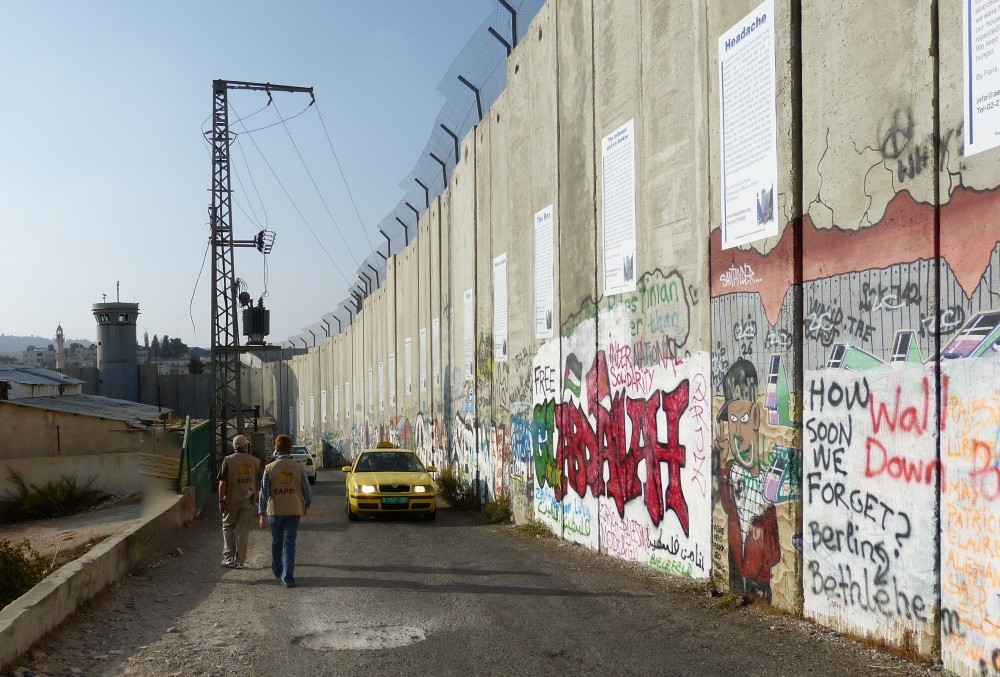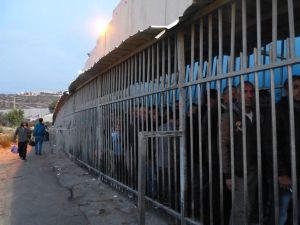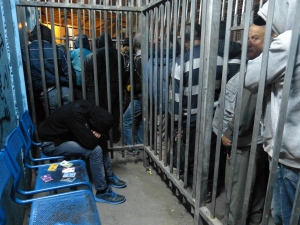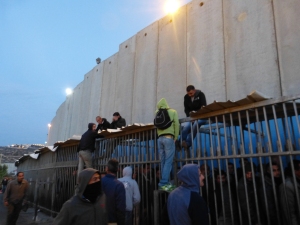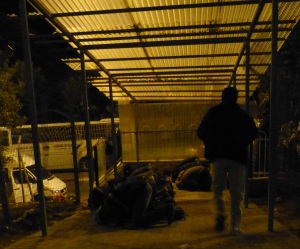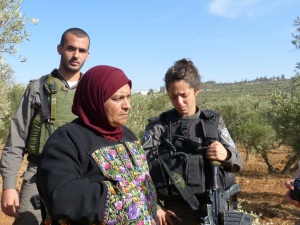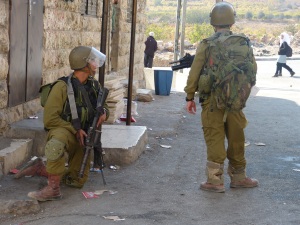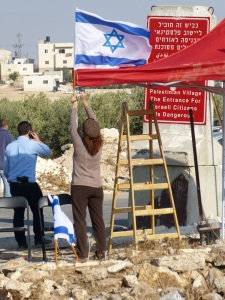It is 3.45 a.m. and my team-mate and I arrive for our regular monitoring duty at Israeli Checkpoint 300, which allows entry through the Separation Barrier, from Bethlehem to East Jerusalem. Nearly 200 men are already queuing for the checkpoint to open and hundreds more are swarming in to join the crush at the bottom of the main entrance lane – a huge cage, 1m wide and about 300m long, totally enclosed by iron bars.
Over 5,000 Palestinians trudge through this checkpoint between 4 a.m.and 7 a.m. everyday. They are mostly men, eager to catch busses on the other side to go to work on building sites and other low paid jobs in Israel, because the occupation has strangled the Palestinian economy. The same osmosis is happening across checkpoints up and down the concrete and wire membrane that now surrounds the West Bank; 32,000 grey figures in dusty working clothes and heavy boots, filtering East to West in pre-dawn darkness, unseen by the world. Yet these people consider themselves the lucky few. They have been granted permits to work in Israel or to attend a hospital appointment in East Jerusalem.
The men queue for up to 80 minutes each morning. Young and old, crammed together like cattle in the blue cage, shuffling slowly up the lane to a single turnstile. If someone should be taken ill, or injured, there is no chance of getting out until he reaches the turnstile. Only internationals and a handful of Palestinian women, children and old men with permits for hospital appointments, are allowed through the separate ‘humanitarian’ turnstile. After the first turnstile the younger men race across the tarmac to the terminal building, leaping barriers to get ahead in the next queue through more turnstiles, metal detectors and finally to the ID booths. Here each person must hold up his ID card to the glass, followed by his work permit and place his finger on an electronic finger print scanner. All this is checked by a bored and sullen Israeli soldier, wearing a bullet proof vest and an automatic machine gun behind the bullet proof glass. Private Israeli security guards with sub-machine guns prowl near the ID booths. A tannoy voice barks orders in Hebrew at the lines of Palestinians.
This morning is worst than usual. The soldier controlling the first turnstile keeps locking it every few minutes. The bars rebound jarringly in the face of an old man and the queue halts for the fifth time. The crush of bodies intensifies for the next 20 minutes. Men begin shouting and complaining. Many climb over the top of the cage and queue-jump through gaps in the corrugated tin roof, desperate not to miss their busses and lose a day’s pay. When the turnstile finally opens again, 500 men surge through in 10 minutes calling ‘Yalla, yalla!’ (Go,go) to those ahead. One man stumbles, falls and is nearly trampled by the crowd pushing up behind. He is saved by another man who braces himself across the line whilst others haul the man to his feet.
I ring the military ‘Humanitarian Hotline’ three times. The soldier answering tells me it is a new unit on duty today and they don’t know what they are doing. After a few minutes two armed security guards appear from the main terminal to reinforce the soldier, rather than help people in the cage. I speak to the guards from my observation spot alongside the cage, asking them to do something before someone gets trampled or crushed. One of the new security guards finally turns and yells at me, motioning towards the crowd in the cage, ‘You do something! This is not Israel!’ as if the it is the behaviour of the Palestinians that is the problem. ‘That’s right!’ I respond in astonishment at this admission, ‘This is not Israel – it is Palestine! But Israel built the checkpoint and (Separation) Wall’. He turns his back on me.
My team-mate and I change places and I move to monitor the ID booths near the exit on the Jerusalem side. Only one of three metal detectors is open and the soldiers in the five ID booths keep turning men back. We try to speak to those who are refused entry to find out why. Most are given no explanation and we work with the Israeli human rights organisation, Machsom Watch, to find out. Sometimes the Palestinian has suddenly been blacklisted for unexplained ‘security reasons’. Sometimes his work permit has expired. People often don’t know that their permit has expired until they get to the checkpoint. The Israeli employer applies for the permits for their workers and sometimes simply cancel them when they no longer need the workers. The employee only finds out when he reaches the ID booth, after hours of travelling and queuing.
In addition to the thirty two thousand who are permitted to enter East Jerusalem and Israel, the Israeli authorities are well aware that another 20,000 West Bank Palestinians enter Israel without permits each day. Thousands of people, desperate for work, walk for hours across hills and through woods where the Barrier does not yet reach. The risks are high and many people serve repeated terms in Israeli prisons when they are discovered in Israel without a permit. A high proportion of the West Bank population was dependent on work in Israel before Israel began building the Separation Barrier in 2002. By then, the years of occupation since 1967 had dismantled the West Bank’s economy, with Israel controlling and taxing raw materials and products; the costs and uncertainty deterring investment.
After two and a half hours, people begin to stream through the terminal. The inexperienced Israeli army unit have finally given up and simply thrown opened the gates, allowing everyone to by-pass the security checks, as though acknowledging that security is not the real issue here.
And after enduring this systematic inhumanity and humiliation day in, day out, these Palestinians pass me at the exit with a smile and ‘Good morning’ – many kneeling for morning prayers on the exit slope – refusing to be humiliated, refusing to be dehumanised.
